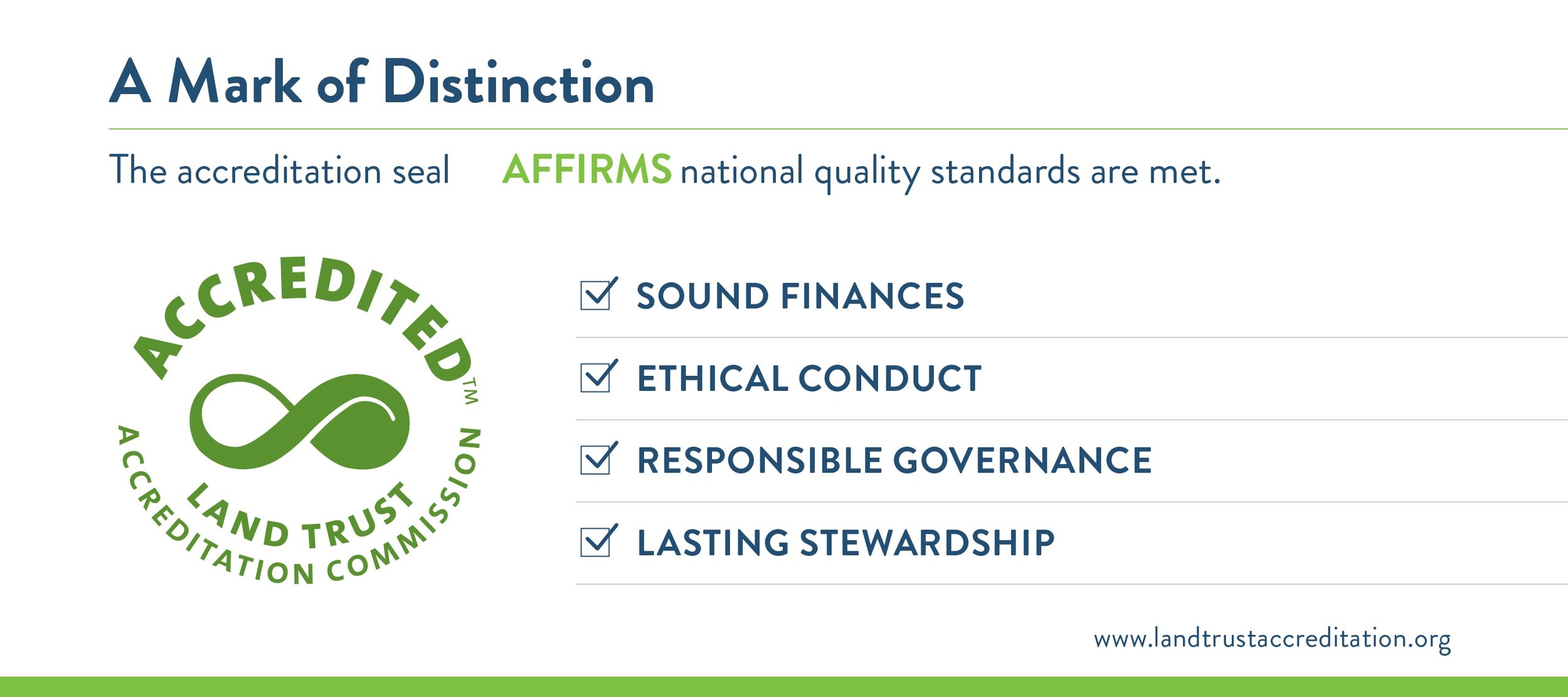What is an easement?
Landowners interested in conservation generally have two principal concerns. The first concern is the desire to protect natural resources on their property. The landowner is interested in conserving special features such as streams, fertile soil, mature trees, wildlife habitat, or a piece of history – even after his or her ownership comes to an end. A conservation easement is a valuable tool landowners can use to restrict intensive development and other uses in perpetuity.
Second, landowners may also be concerned about the long-term financial status of their property. Land owners must contend with the increasing tax burden associated with property ownership. Estate taxes, property taxes and the financial incentive to sell or develop are all factors that affect land use decisions.
Conservation easements enable landowners to protect resources they value for their children and future generations while maintaining private ownership. The donation of a conservation easement may have potentially significant tax benefits, including reduced income taxes and/or estate taxes.
Common Questions about Conservation Easements
Conservation easements are recognized for legal purposes by the Commonwealth of Kentucky (KRS 382.800) and for tax purposes by the Internal Revenue Service (Internal Revenue Code, Section 170(h)). Before completing a conservation easement agreement, landowners should consult with their legal and tax advisors.
Does a conservation easement grant public access to my property?
No. Landowners retain control of access to their property. There is no requirement that they allow access to specific groups or the general public in their conservation easement agreement, but they may do so if they wish.
Can I still sell my property?
Yes. Property with a conservation easement can be bought, sold, and inherited. However, the conservation easement is tied to the land and binds all present and future owners to its terms and restrictions.
Can I still build on my property?
The landowner may retain specified development rights in a conservation easement agreement. For example, a conservation easement protecting a farm can allow construction compatible with agricultural operations as well as changes in crop selection or management practices. A conservation easement must specify the location, size and type of additional residences or other development on a property. Easements granting building sites which compromise conservation values of the property will not be accepted by WWLT.
Can a conservation easement be donated by will?
Yes. To be sure the easement is established, the landowner must contact the intended easement holder before conveying the easement in a will in order to ensure that the organization will accept the donation. If the easement qualifies under federal tax law, its value is subtracted from the landowner’s taxable estate, reducing estate taxes for heirs. Also under Federal law, the executor or heirs of an estate can donate a qualified easement after the death of the landowner, even if the landowner’s will does not donate an easement. A landowner who might want his or her executor or heirs to be able to make this donation should clarify the intent on this matter by stating in the will that the executor and heirs have this power.
Does every easement qualify for an income tax deduction?
To qualify as a charitable contribution, conservation easement donations must: be perpetual, be donated to a qualified organization (a nonprofit land trust or public agency); and meet one of the “conservation purposes” tests outlined in the Internal Revenue Code.
How does an easement affect the resale value of my property?
The resale value of land with use restricted by an easement is based on the appraised value of the land determined by the allowed uses of the land. Because land under an easement cannot be subdivided, its resale value is generally lower than other comparable land. The value of land adjacent to protected land generally goes up in value.
Can conservation easements be changed or revoked?
Because conservation easements qualifying under IRS regulations are designed to be permanent, landowners should assume that it will not be possibleto revoke an easement. However, conservation easements can be amended if 1) both the easement holder and the landowner agree to the terms of the change; and 2) the IRS-recognized “conservation purpose” of the conservation easement is improved.
How is a conservation easement enforced?
The land trust or conservation organization that holds the easement bears the responsibility of enforcing its terms. Typically, this means that the easement holder will schedule a property visit with the landowner at least once a year to document any development or changed uses. Unless the landowner and easement holder specifically agree to give enforcement rights to a third party, no outside group can enforce the terms of a conservation easement. A landowner who violates the terms of the easement would be subject to litigation initiated by the land trust.
Does every easement have to be perpetual?
For the donation to qualify for income and estate tax benefits, the conservation easement must be perpetual and apply to all future owners. Some organizations, however, may be willing to purchase conservation easements that are designed for a period of years. For example, the Wetlands Reserve Program administered by the Natural Resources Conservation Service, pays landowners for limited-term conservation easements on wetlands that provide significant habitat for birds and other wildlife.
Can easements be purchased?
Yes. Conservation organizations and government entities purchase easements of natural lands of exceptional quality or lands that meet specific conservation qualifications. Some easements are purchased simply to restrict development. One example is a “purchase of development rights” or PDR program. This conservation method pays willing landowners to restrict development of their land. After selling the development rights, the landowner retains all other rights of ownership.
For more information, contact us.
